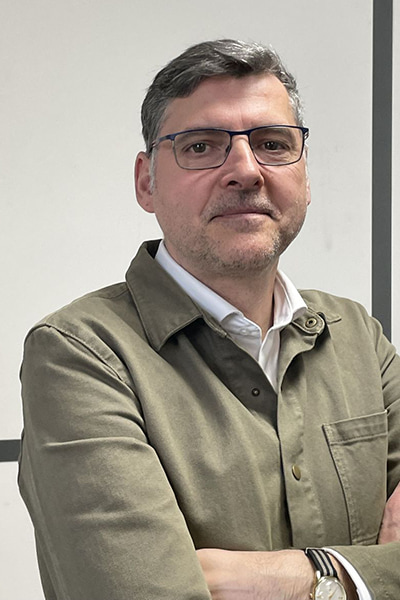- Research,
‘A lawyer who knows how to talk to architects’: read our interview with Didier Krajeski, Director of IEJUC

• Why did you choose rural law and insurance law as your specialisation?
After completing a Master's degree and a thesis supervised by Professor Philippe Le Tourneau on a fairly theoretical subject, Intuitus personae in contracts, I obtained a position in 1999 as a lecturer in insurance law and rural law at UT Capitole. This allowed me to continue practising civil law, a subject I love above all else, and to move towards more practical areas of study. What I enjoy is providing concrete and useful answers. Rural lawyers, few in number, are in high demand to participate in conferences and provide training. That is why I lecture at many universities and notary schools in France. Travelling allows me to encounter a wide variety of practices, such as the use of rural lease status, which varies from region to region. After obtaining my research qualification in 2006, I became a university professor through internal aggregation in 2013.
• Can you tell us about the IEJUC laboratory, of which you are the director?
Since its creation in 1954, IEJUC has focused on the legal study of land use, through topics such as the environment, urban planning, agriculture and heritage. We work on societal issues, sometimes with major financial implications, such as climate change, renewable energy, species protection, public contracts and social housing. Research in these fields is naturally interdisciplinary and inter-scientific. We regularly collaborate with other specialists: agronomists, surveyors, sociologists, engineers, architects, economists, estate agents, etc. The Institute's 14 lecturers, researchers and doctoral students enjoy working in teams with the outside world. The journal Droit et Ville, which we have been publishing since 1976, is a good illustration of this commitment: it consists of multidisciplinary analyses, both legal and non-legal, written by French and foreign researchers. Our rich and dynamic team does not hesitate to respond to specific requests. For example, we have studied carbon capture through agriculture at the request of a Member of the European Parliament, and the ecological services provided by soils, work that was recognised with an IdEx award.
We work on societal issues, sometimes with major financial implications, such as climate change, renewable energy, species protection, public contracts and social housing.
• What administrative responsibilities have you taken on throughout your career at UT Capitole?
Administrative responsibilities are an important part of an academic career. I have been a member of the Faculty Council twice, as well as a member of the Board of Directors and section chair. I have also directed a number of degree programmes, such as the Master's in Notarial Law, Contracts and Insurance. Currently, I am directing the University Diploma in Personal Injury Law. Changing responsibilities regularly is very rewarding.
• What does your GEPABA research project, funded by TIRIS for a period of five years, involve?
The aim of the project, whose acronym stands for ‘Sustainable Management of Built Heritage’, is to organise a seminar in which students from different disciplines will come together to work in teams and in an interdisciplinary manner on the same subject of study. Thus, volunteer students in the Master 2 Environmental Law, Property Law or Public Business Law at UT Capitole will propose a renovation project in collaboration with students from Paul-Sabatier, Champollion and Jean-Jaurès universities, INSA, the Toulouse School of Architecture and even The Laboratory of Materials and Durability of Constructions (LMDC) in Tarbes. In parallel with the research project, multidisciplinary courses will also be offered to students, with a certificate at the end. The aim is to broaden their field of expertise. Funded by TIRIS, this seminar will be launched in October-November 2024 and repeated every year for five years. Beyond that, we hope that it will lead to the creation of a university diploma.
• How did this collaborative project come about?
An architecture teacher who initiated this project contacted me, as director of IEJUC, to act as legal advisor, from the start of discussions through to the implementation of the seminar. We put together a small team of speakers and considered the first renovation topic to be presented. This could be a building in Toulouse, such as a university hall of residence or low-income housing, or a neighbourhood-scale project, such as the former AZF site. GEPABA is part of the dynamic that has always been at the heart of IEJUC. It is the first step in a collaboration with these partners. In the future, we hope to work together again on a research project related to housing.
We have put together a small team of contributors and considered the first renovation topic that will be assigned. It could be a building in Toulouse, such as a university hall of residence or low-income housing, or a neighbourhood-scale project, such as the former AZF site.
• What other projects are you working on at the moment?
As we do every year, at the end of June, we organise ‘Les Doctoriales’, two days of conferences for doctoral students, to coincide with the thesis monitoring committees. The topics covered may be theoretical or relate to methodological issues, such as legal argumentation. This is an opportunity for doctoral students to learn and develop their general knowledge, but above all it is a chance to socialise and exchange ideas.
